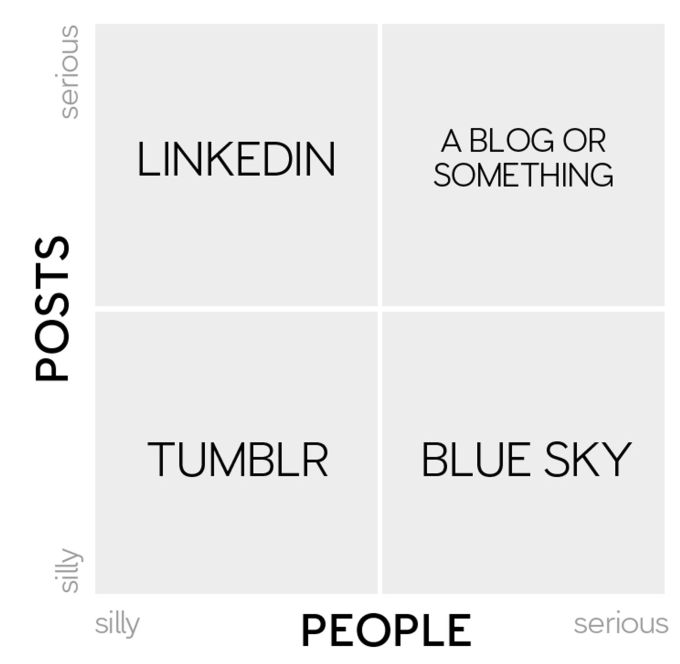Bluesky’s best shot at success is to embrace shitposting
I have joined so many social media websites since October 27, 2022, the fateful day in which Elon Musk tanked his net worth and volunteered for the worst job in the world. There’s Mastodon, T2, Spoutible, Hive, Post, Cohost and so many more, but no Twitter alternative has felt as promising as Bluesky. That is, in part, because of how much shitposting is going on there.
Bluesky hatched from Twitter’s nest in 2019, when Twitter founder Jack Dorsey announced that the platform would fund a small, independent team to develop a decentralized standard for social media. Like Mastodon, Bluesky plans to be federated, meaning that endless individually operated communities can exist within an open source network. Before we could have ever considered that Musk would buy Twitter, the “bluesky initiative” was central to the company’s long game — now the independent team has launched its invite-only beta, still operating with funding from Dorsey. (Yes, we know how sad it is that we are so excited for a Twitter alternative that is literally funded by a Twitter founder who publicly declared that Musk is the “singular solution” he trusts with his old company.)
As one astute Bluesky user, Pavel Samsonov, wrote: “bluesky (serious people making silly little posts) is the spiritual opposite of linkedin (deeply silly people trying to write serious thoughtposts).” Samsonov even included a handy visual aid.

Image Credits: Pavel Samsonov on Bluesky
It’s an apt description. I’m seeing the same journalists and tech folk that I follow on Twitter — I even found someone I know from Weird Facebook — but people aren’t talking about earning reports, layoffs and stocks. In this particular moment, Bluesky is a collection of people who remain addicted to the adrenaline of Twitteresque microblogging but are exhausted by the constant onslaught of asinine discourse and Musky shenanigans. Enter: shitposting.
In what feels like a few days, a silly and chaotic culture has developed on Bluesky. There is no name for posts, like how Twitter has tweets, or how Mastodon used to have toots until they retired that branding because they’re cowards. So, people are calling Bluesky posts “skeets,” a portmanteau of “tweet” and “sky” that I am pretty sure is slang for ejaculate fluid but I will not fact check that because I am holding on to my one last shred of sanity.
Rich Burroughs, a developer advocate, thinks that this culture was formed from the top down. Some Bluesky developers are very active on the platform that they’re building in real time, responding to users’ questions, complaints and feature suggestions, all while still acting like a real person.
“Some of the staff seem to be accomplished shitposters themselves, which I think is a great energy that has been lacking with other Twitter alternatives,” Burroughs told TechCrunch. “People keep building these super serious feeling platforms to compete with Twitter, but what’s happening on Bluesky feels a lot like the early Twitter days, and why it became successful.”
After publicly feuding with Musk, who gave him a blue check against his will, legendary shitposter Dril joined Bluesky today. Bryan Newbold, an employee of Bluesky, posted, “if first @dril.bsky.social poast sucks we are going to burn the whole thing down and try again.”

Image Credits: @emily.bsky.team on Bluesky
Dril fandom seems to be all the rage among the Bluesky team. Another developer, Emily Liu, posted that Newbold gifted her with a book of Dril’s best tweets upon joining the team (also pictured is a book called “There Is No Antimemetics Division,” which sounds like something I should read ASAP). This fact seemed a bit too perfect for arguing my thesis that Bluesky will succeed by deliberately cultivating shitposting, so I double-checked with Newbold to make sure this was legit. He replied: “It Is The Public Stated Policy Of Bluesky PBLLC That All New Employees Shall Receive The Finest @dril.bsky.social Tweets In Printed Form.” Make of that what you will.
When dismayed Twitter users scrambled to find a new platform to call home, some flocked to Tumblr, another social network that has largely failed to monetize because its user base is deliberately resistant to behaving predictably. When Tumblr rolled out a creator subscription product, users vehemently opposed it. As per data from November, more Tumblr users have purchased dashboard crabs (pixelated crabs that dance around your dashboard and can be gifted to friends) than actual creator subscriptions. And as a very targeted gag, Tumblr also offered users the chance to buy not one, but two blue checks for $8.
In spirit, Bluesky feels a bit like Tumblr, except that I have not yet seen anyone drop a link to Archive of Our Own and/or a Ray-Ban sale. But unlike Tumblr, these aren’t high school kids shitposting about “Supernatural”; they’re adults with jobs who are looking for a social media experience as far removed from LinkedIn as possible.
Sure, this is all a generalization, and perhaps there is some very serious corner of Bluesky that I have not yet encountered. But Bluesky seems to have taken what people enjoyed about Mastodon and Twitter and mushed it together, without as many of the bad parts. Though Bluesky’s architecture is similar to Mastodon’s, Bluesky is intuitive, while Mastodon comes off as inaccessible: Choosing what instance to join feels like an impossible task, and longtime users are very defensive about their established tooting posting norms, which can make joining the conversation intimidating. As tech reporter Paris Martineau wrote on Bluesky, “genuinely, i think mastodon failed because it discouraged shitposting.”
Bluesky still has a lot to overcome. The platform has not yet had to contend with the large-scale content moderation concerns that come with decentralization, and the app remains a walled garden (please don’t DM me for invite codes; I do not have any). But at least for this sliver of internet history, Bluesky is feeling good. And Dril is here.

